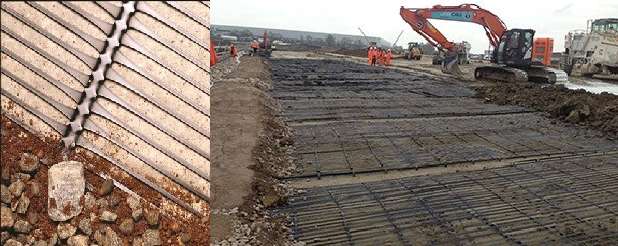Dr. Huvaj’s TUBITAK CAREER Project
 [/frame]
Asst. Prof. Nejan HUVAJ, faculty member at METU Civil Engineering Department, is the principal investigator of a newly funded TUBITAK 3501 CAREER project entitled “Interaction of Marginal Fills and Geogrids for Reinforced Soil Walls and Slopes”. The project, which started in October 2017, will be finalized in 2020. One Ph.D. and one M.S. student will be project assistants in this research project. The main objective of this project is to investigate the interaction of marginal fill materials and novel geosynthetics in geogrid-reinforced walls and slopes by laboratory experiments and with numerical modelling, in the end to provide recommendations for the development of a technical standard.
[frame align=”center”]
[/frame]
Asst. Prof. Nejan HUVAJ, faculty member at METU Civil Engineering Department, is the principal investigator of a newly funded TUBITAK 3501 CAREER project entitled “Interaction of Marginal Fills and Geogrids for Reinforced Soil Walls and Slopes”. The project, which started in October 2017, will be finalized in 2020. One Ph.D. and one M.S. student will be project assistants in this research project. The main objective of this project is to investigate the interaction of marginal fill materials and novel geosynthetics in geogrid-reinforced walls and slopes by laboratory experiments and with numerical modelling, in the end to provide recommendations for the development of a technical standard.
[frame align=”center”] [/frame]
[/frame]
Reinforced soil slope and wall constructions are quite popular because of their advantages in terms of, construction speed, durability and construction cost. The use of granular backfill material is the recommended practice by most international design guidelines. That being said, these granular material may not be found near the construction sites and should be transferred to the site from far distances, also causing the site-available fill materials to be discarded. The cost, availability and transportation of granular material raise the cost of construction. There are significant economic and environmental benefits in using marginal fill materials readily available on site, or waste materials from different industries. Marginal fill material is defined as a predominantly granular soil, having high fines content. Considering life-cycle cost assessment, sustainability and green construction, the use of locally available fill materials (or other waste materials) can provide environmental benefits, for example, by reducing carbon footprint of projects.
This project aims to contribute to the usage of marginal fill in geogrid-reinforced earth walls and slopes. For this purpose, large direct shear tests (width 300 mm x length 300 mm x height 300 mm) will be conducted to investigate soil-geogrid interaction mechanism for granular soils having different fines contents (0 up to %40) and having different plasticity indices. Also, different and novel geogrids will be utilized and the effect of different geogrid characteristics will be analyzed. Additionally, negative and positive pore water pressures will be measured and its effect on interaction mechanism, bond coefficients and interface shear properties will be discussed. Furthermore, numerical simulations of geogrid-soil interaction mechanism will be carried out.
